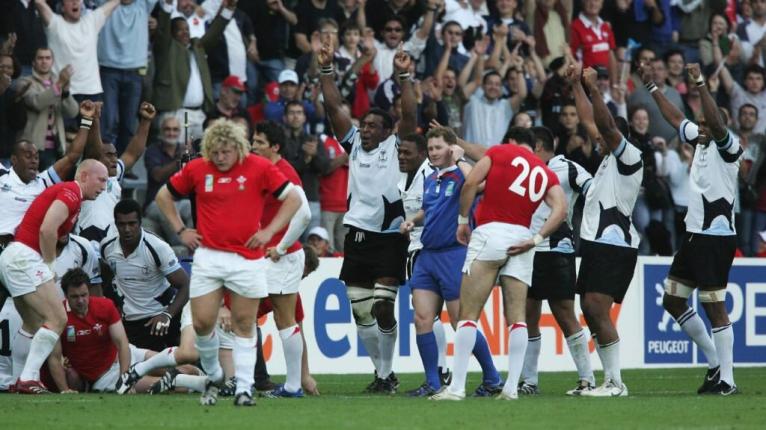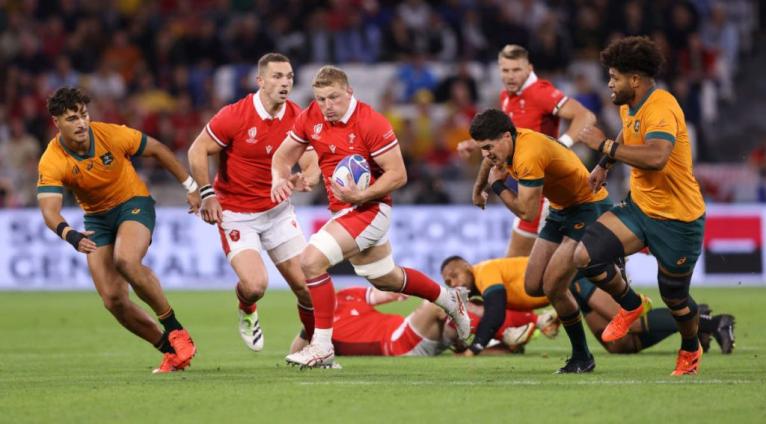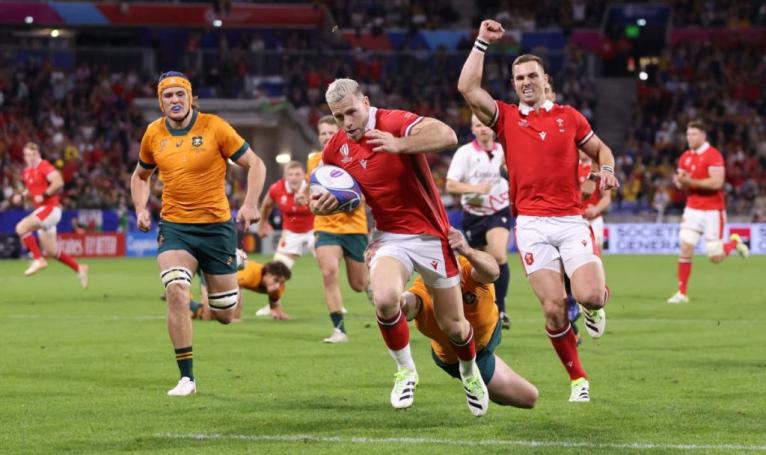There would be a quiet part of the show, and you’d hear Ianto [Ian Evans} go: ‘Five sambucas, please, butt’ at the top of his voice, as a row of angry faces turned round in unison.”
So remembers the ex-Wales centre Tom Shanklin in Ross Harries’ illuminating book, Behind the Dragon: Playing Rugby for Wales, of a scene played out in a classy cabaret theatre in Paris during the 2007 World Cup.
Welsh players had gone there in search of something different, something French.
By all accounts, the night was one to remember.
But maybe a belting night on the pop, as former lock Ian Gough attests in the same tome, wasn’t the wisest move during a global-tournament campaign: “In retrospect, the week before a crunch game in the World Cup probably wasn’t the best time to have one of the biggest booze-ups of your lives.”
History tells us Welsh interest ended a week later when the team coached by Gareth Jenkins were downed 38-34 by Fiji.

They didn’t lose because they relaxed a shade too much in the run-up to a big game – their defence took a day off when it wasn’t advisable to do so, with the side lured into playing sevens-style rugby against the masters of the genre – but it didn’t help and the Welsh effort at the tournament 16 years ago is remembered as inglorious.
There again, it wasn’t the first time Wales had erred at a World Cup.
There were horrors in 1995, notably one overseen by team manager Geoff Evans, who oddly thought it a clever ploy to bait New Zealand before the two countries met in a pool game. A 34-9 win for the All Blacks underlined the folly of such misguided rhetoric.
And in 2003 Steve Hansen omitted Gavin Henson from his squad. Anyone who had watched Henson playing for Swansea at that time – the booming kicks, gliding runs, improbable tries and sweetly-struck drop-goals, one of which prompted the Whites’ then-coach John Plumtree to say to himself, “Naas Botha”, will recognise how questionable that call was.
Like a darts ace on a roll at Ally Pally, Gatland has been finding the target with impressive consistency.
But so far in this edition of rugby’s biggest tournament, Warren Gatland has barely put a foot wrong.
Just remember where Wales were in the Six Nations: on the far side of nowhere, walloped by Ireland, beaten out of sight by Scotland, on the wrong end of their heaviest defeat by England in Cardiff since 2003. When South Africa put 52 points on a mix-and-match side at the Principality Stadium in the team’s final World Cup warm-up, Cymric optimism seemed as hard to locate as a blue scarf at Anfield. A group which included Fiji and Australia, plus Georgia and stylish up-and-comers Portugal, looked an accident waiting to happen for Gatland’s side.
But that was then. Now, they are in the last eight and plenty are raising the possibility of a semi-final spot. One or two super-optimists are daring to dream of even greater glory.
Gatland will not be looking that far ahead. The man who has overseen more World Cup games as a head coach than anyone else will understand how quickly euphoria can give way to something altogether less palatable if a team is allowed to lose focus.
But the New Zealander can be pleased with the job he is doing.
The striking thing is how many of his calls have come off. Like a darts ace on a roll at Ally Pally, Gatland has been finding the target with impressive consistency.
Maybe his most important decision of the lot was to give Jac Morgan leadership responsibility, with the 23-year-old having evidently failed to receive the memo that the Welsh class of ‘23 was destined only for ignominy.

In all three Wales games to date, he’s been there or thereabouts as the team’s best player. Against Australia, the defining point of the match came after 26 minutes with Wales defending a four-point lead. The Wallabies were building momentum and had secured a lineout deep in Welsh territory. There was a real chance the opposition’s slender advantage could be wiped out. But Morgan decided otherwise. In an instant, he imposed his will on proceedings, bending the game decisively Wales’ way, with a steal at the back of the set-piece followed by a 50:22 that could more accurately be described as an 80:22. Minutes later, Gareth Anscombe kicked a penalty, and Wales never looked back.
Morgan was brought up in Brynamman, the place where the folk singer Dafydd Iwan was born. Iwan’s Yma O Hyd (Still Here) is a stirring anthem which has been adopted by a number of Welsh sporting teams. As Wales look towards the quarter-finals of this World Cup, their players and coaches could be forgiven for humming the odd line from Iwan’s paean to endurance in the face of adversity. Certainly, their co-captain’s displays in France have been loaded with defiance.
Gatland’s call to stick with the much-maligned Adam Beard has also been vindicated. The big lock, remember, had become the keyboard warriors’ punchbag of choice. Possibly, some might have blamed him for the melting of the polar ice caps and the malaise of the UK economy. Maybe some who disagree with the 20mph speed restrictions in Wales felt somehow Beard was culpable. Who knows, one or two might even have reckoned it was his fault the Wales football team failed to qualify for the 1978 World Cup.
But Beard answered his critics with a strong effort against Australia. There was an important maul turnover with Nick Tompkins that helped set the tone for the second half, impressively assured work at lineouts, determined input at mauls and unyielding defence bettered only in terms of number of tackles by Morgan.
This year alone, Gatland has used four different 12s. But he seems to have found what he’s looking for in Tompkins.
On the occasion of his 50th cap, Beard also provided leadership. With Wales 35-6 up and five minutes to play, he could be seen urging his team-mates to lower their tackle height after the concession of a needless penalty. In the final minute, the 6ft 8ins lock was still going strong, driving into contact and clearing out opposition players. It was a performance to be proud of, justifying Gatland’s decision not to listen to those on the outside who had been urging the head coach to downgrade the man from Swansea.
The Kiwi has solved who to play in Wales’ problem position as well. Selectors had been chopping and changing at inside-centre ever since Hadleigh Parkes wandered off into the sunset in 2020. Wayne Pivac used five number 12s during his first 10 matches. Operating at fly-half, Dan Biggar could have been forgiven for struggling to remember the names of some of them.
The idea of Wales having a 10-12 partnership based on complementary skills and intuitive understanding was for the birds. It reached the point where Mark Ring, an outside-the-box thinker, who could comfortably operate in the second-playmaker role, suggested it might be worth shifting Biggar to the bothersome inside-centre spot, to at least offer the team an extra kicking option.
It didn’t happen, of course, and Wales kept ringing the changes. This year alone, Gatland has used four different 12s. But he seems to have found what he’s looking for in Tompkins.
The Saracen isn’t a route-one merchant who will take a side over the gain-line in the manner of Jamie Roberts circa 2012, nor is he a particularly notable kicker of a ball or an especially sweet passer who can do for Wales what Ring once did to such telling effect. But he is a midfielder who rarely fails to impact.
In France, he has come up against Semi Radradra and Samu Kerevi, two of the most highly rated centres in the world, and emerged in credit on each occasion. By the time Kerevi resorted to clothes-lining his opposite number early in the second half in Lyon, Tompkins had already scored a try that owed much to his anticipation. He and George North, helped by Tomos Williams, also held up Marika Koroibete in a passage of play when Australia’s lack of imagination on the night threatened to turn to frustration. In another key contribution Tompkins doubled up with Morgan in the final play to keep out Wallaby replacement Suliasi Vunivalu when a try had appeared certain. Such determination, industry and sheer adaptability are priceless to a team.

Other Gatland decisions which have worked a treat? Reinstating Gareth Davies as first-choice scrum-half and putting faith in Ryan Elias at hooker.
Davies had appeared worryingly close to slipping off the radar not so long ago, starting in just one of 24 Wales Tests. But Gatland has long been a fan and the Scarlet has not let him down since his recall to frontline duty. He has begun three Tests over the past two months, and Wales have won them all. It isn’t just anoraks who’ll be aware of that stat. The Welsh coaches would probably have picked up on it, too.
Elias has put an injury-plagued year behind him to reassert himself in the front-row. The suspicion is Wales would benefit from having a fully fit Dewi Lake somewhere in their matchday group, for the 6ft 1in, 17st 11lb Osprey is a specimen who’d probably move Ayers Rock back a few inches if he broke into a jog and dropped his shoulder.
But Elias and Elliot Dee have been finding their men in the lineouts, with Wales successful with 27 of their 29 throws in the games against Fiji and Australia. Both players have also been commendably physical around the field.
So the selections at hooker have delivered for Gatland, who is himself once again performing strongly on the biggest stage.
Georgia next up will not be easy if the eastern Europeans display the same resolve they showed against Fiji. But momentum is all-important in tournament rugby, and right now Wales have it.
That reflects well on the players and on the coaches making the key calls.
So far, it’s all been mightily impressive to see.


Comments
Join free and tell us what you really think!
Sign up for free